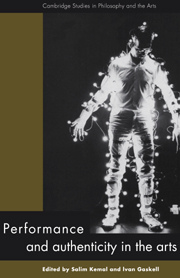Book contents
- Frontmatter
- Contents
- List of Contributors
- Editors' Acknowledgments
- 1 Performance and authenticity
- Part I Performance, religion, and authenticity
- Part II Understanding, performance, and authenticity
- Part III Authenticity, poetry, and performance
- 10 Inauthenticity, insincerity, and poetry
- 11 Poetry's oral stage
- 12 True stories: Spalding Gray and the authenticities of performance
- Index
10 - Inauthenticity, insincerity, and poetry
Published online by Cambridge University Press: 12 November 2009
- Frontmatter
- Contents
- List of Contributors
- Editors' Acknowledgments
- 1 Performance and authenticity
- Part I Performance, religion, and authenticity
- Part II Understanding, performance, and authenticity
- Part III Authenticity, poetry, and performance
- 10 Inauthenticity, insincerity, and poetry
- 11 Poetry's oral stage
- 12 True stories: Spalding Gray and the authenticities of performance
- Index
Summary
Inauthenticity, whether in a person's character and attitudes, or in the arts and crafts, invariably marks a flaw or failing in whatever it characterizes. In a person's life, one manifestation of inauthenticity is that of insincerity: not meaning what one says or feels, pretending to have sentiments (I use the term in a Humean sense, to include beliefs and desires as well as less obviously cognitive feelings and emotions) that one does not in fact have. And it is sometimes said that there is an analogous case in the arts: that one way in which a work of art may be inauthentic is in virtue of being insincere, of expressing or articulating sentiments which are or were not in fact those of the artist. In what follows, I wish to consider whether this is correct; whether insincerity may indeed be a manifestation of inauthenticity in the arts, and in particular in poetry. Can the fact that a poet is insincere, in the sense that her poems express sentiments which she does not feel, make those poems inauthentic?
Needless to say, pretending to have sentiments which one does not in fact have is not the only way in which one may be insincere, far less the only way in which inauthenticity may manifest itself in a person's life. Nor, clearly, is the fact that the sentiments expressed by a poem are not those of the poet the only fact in virtue of which a poem may properly be characterized as insincere.
- Type
- Chapter
- Information
- Performance and Authenticity in the Arts , pp. 197 - 214Publisher: Cambridge University PressPrint publication year: 1999
- 2
- Cited by



